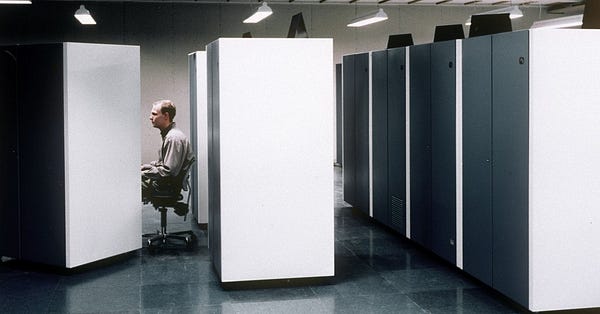Hybrid work, office culture, and what needs to change
The US has no social safety net to speak of...right when we need it the most.
Sree’s newsletter is produced w/ Zach Peterson (@zachprague).
Scroll down for Read Something; Watch Something; and a weekly tech tip from Robert S. Anthony (@newyorkbob).
TUNE IN: Next #NYTReadalong is Sunday, Aug. 15, with Lee Clontz, Director of Teaching & Learning at Emory University (and one of Sree’s favorite former students!). Meanwhile, see recent episodes: Neil Amdur, former NYT sports editor; Shashank Bengali, NYT Live desk, former LAT South Asia bureau chief; Philip Bump, WashPost national correspondent; Margalit Fox, NYT obituaries writer; Jonathan Boorstein, writer & urban ecologist. The NYTReadalong is sponsored by Muck Rack.
My Digimentors team is working with companies and nonprofits around the world to create virtual and hybrid events. We’ve worked on events for 50 people and 100,000 people. See our new brochure. Don’t cancel or postpone your conference - contact us! sree@sree.net
***
I’m hearing a lot from clients around the country about how they’re struggling with back-to-office plans. Hybrid work, staggered re-entry, etc are phrases we are hearing. Some (most?) bosses want everyone back, while this Lisa Fleisher piece in Bloomberg says some Americans are willing to take pay cuts in order to not have to go into the office again. Just as there was no playbook on how to handle the start of the pandemic, there’s no playbook on how to emerge from it (though we know that vaccine disinformation is delaying things unnecessarily and continuing to kill folks).
The lack of a social safety net in the US is a major factor here. But, I don’t think it’s all about the quantifiable stuff. For working families, the “family” part is often a rare experience. When the pandemic hit, work and family had to happen—and that’s when, for a lot of people, work became simply work. No more office politics—just the actual work that has to get done.
This piece by Ed Zitron on the topic is very good:


He’s right. The last year-plus has accelerated the discussion about what work means to us as humans. But, I also think Ed sells the human element a little short. Of course, he’s dead on about the accountability side of things. Remote work is the final boss of the group project journey—the people who do and don’t do the work become very apparent very quickly. First, collaborative creative work often needs an in-person touch that we shouldn’t discount.
More generally (I am going to sound a bit - gasp! - conservative here), we should be mindful of just how drastic this shift is for so many people. As work has shifted to cities and away from agriculture (and populations with it), the office has become a crucial place for human interaction—and for some, it is absolutely the most important place for human contact. Sure, Ed is right that there is a potential for an extinction-level event across middle and upper-middle management, but I do think we need to be mindful of what that change means to people and how companies react.
Sarah Grimstead, an HR professional, wrote a very thoughtful piece for Fast Company on just this. Read it with Ed’s piece and you can see the overlap. This passage from Sarah’s piece describes the thing Ed is saying is exactly the issue.
In-person resources can be less tangible, such as the emotional support extended by colleagues and the benefit of casual office conversations that lead to big business decisions. In the absence of these perks, virtual workers can feel left out of the loop and disengaged. Hybrid working arrangements have the potential to exacerbate communication problems and power imbalances, and, in some situations, irrevocably damage relationships.
This very abrupt change will affect a lot of people’s personal lives via their professional lives.
A lot of the shift is about what “work” really means. As it becomes less important as a societal hub to an increasing amount of people, it becomes more about the actual work. “Work to live, not live to work,” may not becoming the norm, but I certainly hear it from more and more people, and there’s a lot of ink being spilled in an effort to figure out the way forward.
The fact is that this is the new reality—it’s not the future of work, it’s very much the present. Businesses and employers of all shapes and sizes will have to double down on empathy and fairness because this will not be easy.
- Sree
Read Something
Simone Biles owes us nothing. She’s the ultimate hero and role model, she’s the greatest competitor her sport has ever seen, and she has been through hell and back to achieve what she’s achieved—all of it under the American flag. If she feels like she needs a break, then she needs a break. We should cherish this sort of courage and understand the precedent it sets for all of the people out there who admire her. We all get tired; we all feel all-consumed with pressure and deadlines sometimes; too many people are put in difficult, abusive, or exploitative situations; and we all just…need a break sometimes. And that’s not only fine, it’s necessary. Sally Jenkins really nails it here (thanks for flagging, Kara Swisher).


Data Points
This is just about as disappointing as it gets. Covid isn’t going anywhere, and it’s going to be a more difficult next 3-6 months than we think. The idea that public sector employees and frontline healthcare workers aren’t required to be as fully-vaccinated as fully-vaccinated can get is appalling. Are we just going forget all of the painful lessons over the last 18 months?


The Reality of Returning to Work Gets Closer
By Robert S. Anthony
Each week, veteran tech journalist Robert S. Anthony shares a tech tip you don’t want to miss. Follow him @newyorkbob.
As fall approaches, the reality of real, in-person classes and workplaces is starting to set in. Laptops now precariously balanced atop stacked books for videoconferences will soon return to their roots as “mobile” electronics and reappear inside briefcases and backpacks and on airplane food trays.
But are offices, conference rooms, schools and event centers ready for you? Yes and no.
For example, New York’s Javits Convention Center, which until recently was closed except for a Covid-19 vaccination center, is now placing major events on its schedule again, including the PhotoPlus photography conference in the fall, which draws an international audience. The New York Public Library, which had severely limited in-person services and did not allow patrons to even sit down, is now back to almost-full access.
However, despite such optimistic signs, the effect of the pandemic is still obvious: The 2021 New York International Auto Show was suddenly canceled Aug. 4 just two weeks ahead of its scheduled Aug. 20 public opening “due to the growing incidences of the Covid-19 Delta variant....” The show, one of the largest held at the Javits Convention Center, had already been pushed back from its normal early spring time frame.
So how do you prepare for partially open work, school and event environments? Keep that sanitizer handy for everything from shared computers to elevator buttons. Wipe down your tech occasionally with antimicrobial wipes—most devices can handle it.
Check the batteries in your mobile electronics now by going a day without charging them. Better to know today that the batteries are weak than on the first day back to work or class. Amazon and eBay are good sources of battery replacements for older devices (search by your device’s model number) and shops like uBreakiFix can replace batteries in sealed units.
Travel with extra power—which will keep you from reaching for AC or USB power outlets that others have fingered. Power banks like the MyCharge Hub series, which have built-in cables and foldaway AC prongs, offer a good balance between power, charging speed and weight.
That fancy desktop microphone that got you through so many videoconferences at home probably doesn’t travel well. Quality earbuds with a microphone or a lavalier microphone with a lapel clip like those made by PowerDeWise, can keep your voice heard in noisy settings.
Be realistic: A five-year-old laptop probably won’t cut it for long, especially as operating systems like the upcoming Windows 11 become the new standard. But if you can hold out until after the back-to-school rush, bargains on new units may be available.
Finally, keep in mind that sidewalks and office floors aren’t as soft as your living room carpet. Keep your gear in protective cases—and be careful out there.
Watch Something
If you somehow missed it, take the time and watch the testimony from the hearings on the January 6th insurrection. This clip from Sergeant Aquilino Gonell is gut-wrenching, and the rest of the testimony from the other officers is equally, if not more, difficult to watch. What a dark, awful day. I wonder how many of those insurrectionists (or terrorists, as the Capitol Police rightly call them) have Blue Lives Matter paraphernalia… methinks more than a few.
Odds & Ends
🗞 TUNE IN: Next #NYTReadalong is Sunday, Aug. 15, with Lee Clontz, Director of Teaching & Learning at Emory University (and one of Sree’s favorite former students!). Meanwhile, see recent episodes: Neil Amdur, former NYT sports editor; Shashank Bengali, NYT Live desk, former LAT South Asia bureau chief; Philip Bump, WashPost national correspondent; Margalit Fox, NYT obituaries writer; Jonathan Boorstein, writer & urban ecologist. The NYTReadalong is sponsored by Muck Rack.
The NYTReadalong is sponsored by Muck Rack. Interested in sponsorship opportunities? Email sree@digimentors.group and neil@digimentors.group.
The Readalong is followed, on Sundays at 11 am-noon ET, by a medical show I’m co-executive producing with surgeons Sujana Chandrasekhar, M.D. (@DrSujanaENT), and Marina Kurian, M.D. (@MarinaKurian), called She’s On Call (watch live or later).
After 250 episodes in 250 days, my global show has moved from daily episodes to 1-2 times a week. The best way to know when I’m on the air and see all my archived shows, is to subscribe to my YouTube channel or my Whatsapp alerts.
The Sunday #NYTReadalong is sponsored by Muck Rack. Interested in sponsorship opportunities? Email sree@digimentors.group and neil@digimentors.group.
👀 Did we miss anything? Make a mistake? Do you have an idea for anything we’re up to? Let us know! Let’s collaborate!






